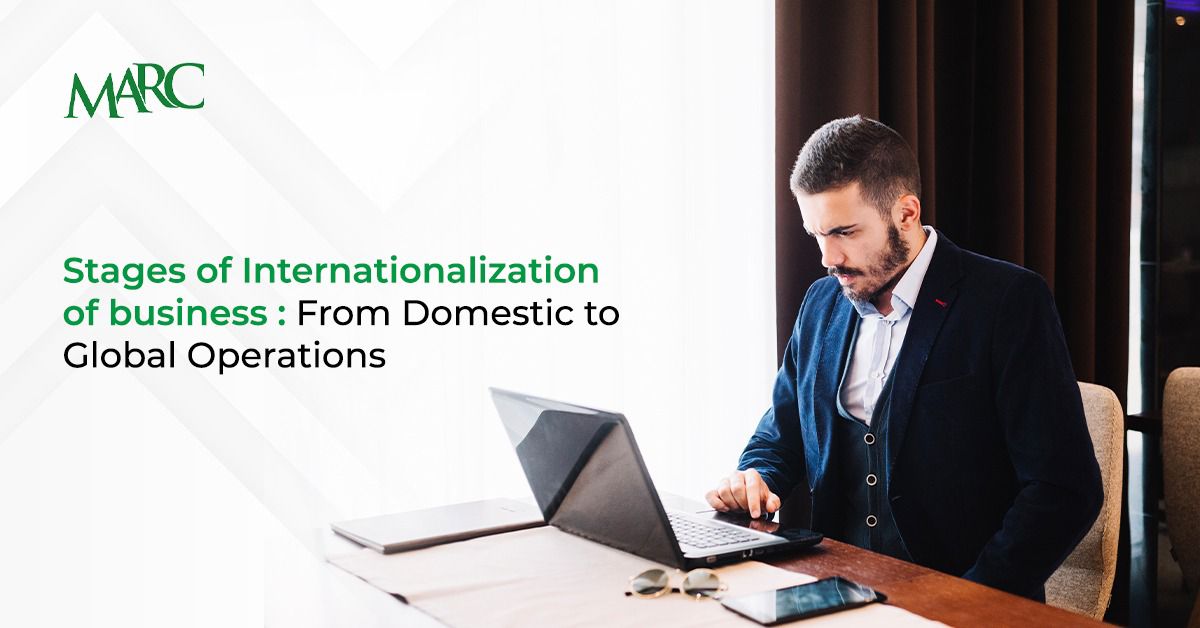
Expanding a company into international markets is not something that can be done overnight. There is so much thought that goes into it and most businesses struggle to navigate the complexities involved in global growth.
The journey through five key stages of internationalization of business offers a complete roadmap to overcome these challenges. This process transforms a business from a domestic player into a global enterprise, with each stage introducing new strategies and obstacles.
Before you decide to go global, it’s important to understand these stages, as they help businesses manage growth effectively. Each stage requires distinct strategies, operations, and market focus, making it essential to approach them with specifically tailored plans.
5 most common stages of internationalization of business that you must know as a business owner:

1. Domestic Stage:
A domestic stage is where a business operates solely within its home country, and its focus is on local market opportunities and navigating national constraints. Its strategy and the game plan is mainly centered around meeting the needs and desires of domestic customers and leveraging local and accessible resources.
Companies that come under this stage typically have a limited international presence, and their operations are within the boundaries of the nation.
A solid example of this would be, Reliance Industries Limited, which started out by dominating the local market before it expanded its operations internationally.
2. International Stage
An international stage begins when a business expands its operations beyond its home country, serving international customers by setting up its branches and subsidiaries in foreign markets. This stage marks the company’s initial steps into international business, where the company intends to explore and look out for new market opportunities.
This is the stage where the company starts to analyze the market and slowly adapts its strategies to fit the new markets but still maintains a significant focus on its domestic base.
Tata Motors Limited is a company that extended its operations by setting up international subsidiaries.
3. Multi-National Stage (MNC)
A Multi-National stage involves operating in multiple countries, fully customizing its products, pricing, and marketing strategies to fulfill the specific needs of each market.
This stage involves adapting the company’s operations and strategies to carefully fit local cultures and customer preferences of the said country. Instead of using a one-size-fits-all approach, the company treats each market separately, to offer relevant products to local consumers.
- McDonald’s, Coca-Cola, and Samsung are prominent examples of Multi-National Companies. McDonald’s operates globally, adapting its menu to local tastes while maintaining its brand identity.
- Coca-Cola on the other hand, offers localized products and marketing strategies across various countries, maintaining a consistent brand image across the globe.
- Samsung is a company that adapts its technological products and strategies to regional markets while utilizing the global resources to the fullest.
4. Global Stage
Unlike the rest of the above stages of internationalization of business, the global stage adopts a comprehensive global strategy, focusing on achieving efficiency and market penetration on a global scale. This ensures that its brand and products have consistent quality no matter which corner of the world it’s sold in. The company integrates its operations around the world, making the best use of resources like manufacturing, technology, and worldwide talent to strengthen its global presence and reach more and more customers across different markets.
One great example of the global stage is Apple. Apple operates with a unified global strategy, where its products like the iPhone, iPad, and Mac are designed and marketed across the globe, keeping in mind the consistent quality.
Though Apple’s manufacturing spans across various countries, its products and brand image have stayed the same throughout, impressing users from every part of the world.
5. Transnational Company
The most ultimate expression of global business is the Transnational Stage that blends worldwide efficiency with local adaptability. Companies in this stage have mastered the art of operating with utmost precision across borders, balancing a unified strategy with the flexibility to meet unique market demands.
Unilever is a standout example of the Transnational stage. With a global presence, Unilever operates across continents while customizing its products and marketing strategies to closely resemble the needs of local cultures.
From Dove to Lipton to Ben & Jerry’s, Unilever’s diverse brands cater to the distinct preferences of consumers worldwide, achieving a perfect synergy between global integration and local relevance.
You might also be interested in reading this: Internationalization Strategy Case Study on Haier Group
How MARC Glocal Can Help with Internationalization?
Expanding your business across borders requires a strategic approach. MARC Glocal is here to guide you through every stage of internationalization, ensuring that your venture into global markets is not only successful but also sustainable with a reliable strategic approach!
Here’s how we can help:
- In-depth Market Research: Gain key market insights to target the right audience globally. With MARC Glocal by your side, you will be able to make informed decisions and identify the perfect opportunities that align with your business goals.
- Tailored Market Entry Strategy: Choosing the right entry strategy is crucial for successful global expansion. That’s why, our experts help you evaluate and select the most effective path for entering new markets, be it through exporting, franchising, joint ventures, or setting up subsidiaries.
- Strategic Partnerships: Connect with the most influential partners to fuel your international growth with our support. At MARC, we help you in every aspect, whether it’s finding local distributors, establishing joint ventures, or collaborating with key stakeholders, we facilitate partnerships that drive success.
- Customized Solutions: No two businesses are the same, and neither are their global ambitions. Through our customized solutions, we create strategies that align with your business model, ensuring that every aspect of your internationalization journey is optimized for success.
- Complete On-the-Ground Support: Entering new markets can be complex, but with MARC, you’re never alone. Our hands on, on-the-ground support provides you with practical assistance and local expertise, ensuring a smooth and efficient entry into new regions.
Grow and expand beyond bounds with MARC by your side!
The journey from a domestic stage to a global stage is indeed a complex task, requiring days and nights of careful planning and expert guidance. At MARC, we specialize in providing tailored solutions for each stage of internationalization of business, helping businesses like yours achieve global success.
We have established ourselves as the preferred choice for top enterprises, with a proven track record of successful partnerships with companies like Isoil, Madaus, Astra, TAJ, and Kineco Kaman. As your trusted partner for international growth, MARC GLOCAL is here to help you unlock your business’s hidden potential and expand its reach.
Contact MARC GLOCAL today to take your business to new heights.
You might also want to check out our blog on Top 8 Goals and Objectives of Employee Performance Management System
Frequently Asked Questions:
A domestic company is undoubtedly the initial stage of the internationalization process. This is when it carries out its operations solely in its home country. Most international firms begin as domestic companies before expanding globally.
A business may be ready for international expansion when it has established a strong domestic presence, developed a scalable business model, and conducted in-depth market research to identify suitable and reliable international opportunities.
Common challenges during international expansion include cultural differences, regulatory compliance, currency fluctuations, and logistical complexities. Businesses need to develop strategies to overcome these challenges.
Businesses can enter by adopting various strategies, such as, exporting, franchising, joint ventures, licensing, and establishing wholly-owned subsidiaries. Each offer is associated with different advantages and risks.
To operate and function successfully as a transnational company, a business must blend global efficiency with local responsiveness. This involves utilizing global resources while customizing products and strategies to meet local market needs efficiently.

